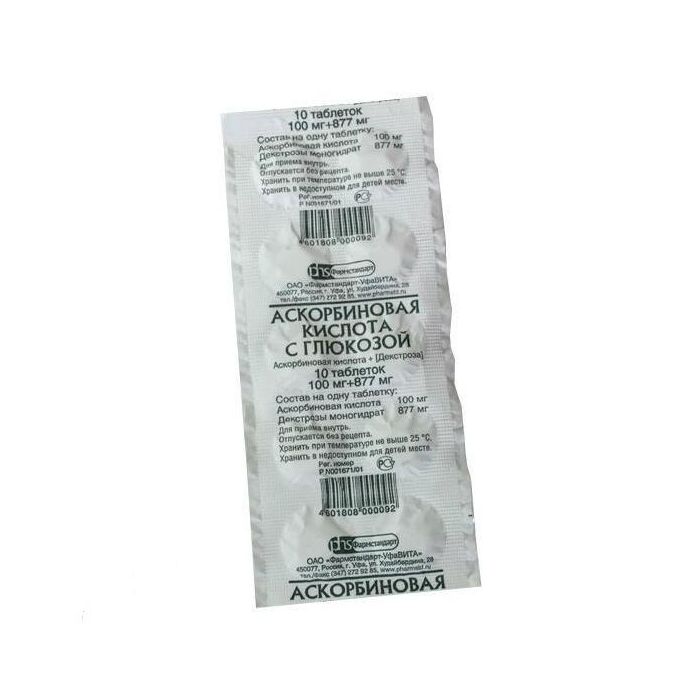ascorbic acid, dextrose | Ascorbic acid with glucose tablets 100 mg 10 pcs.
Special Price
$13.72
Regular Price
$21.00
In stock
SKU
BID494873
Latin name
ASCORBIC ACID WITH GLUCOSE
ASCORBIC ACID WITH GLUCOSE
Latin name
ASCORBIC ACID WITH GLUCOSE
Release form
Tablets.
Packing
10 tablets.
Pharmacological action of
Ascorbic acid has a metabolic effect, is involved in the regulation of redox processes, carbohydrate metabolism, blood coagulation, tissue regeneration, and in the synthesis of steroid hormones it increases the body's resistance to infections reduces vascular permeability reduces the need for vitamins B1, B2, A, E, folic acid, pantothenic acid.
Indications
hypo- and vitamin deficiency C
increased demand for ascorbic acid (period of intensive growth, pregnancy, lactation, increased physical activity, period of convalescence).
Contraindications
hypersensitivity
children's age (up to 3 years).
Caution: diabetes mellitus, deficiency of glucose-6-phosphate dehydrogenase for use in large doses - hemochromatosis, sideroblastic anemia, thalassemia, hyperoxaluria, nephrourolithiasis.
Use during pregnancy and lactation
When prescribing ascorbic acid, carefully read the instructions for use.
Composition
1 tablet contains arbidol (ethyl ester 6-bromo-5-hydroxy-1-methyl-4-dimethylaminomethyl-2-phenylthiomethylindole-3-carboxylic acid hydrochloride monohydrate 50 mg) Substances:
methyl cellulose,
potato starch,
calcium stearate,
stearic acid,
sugar,
polyvinylpyrrolidone,
aerosil,
crpcr101, srdlkrppcrp29, contains only 29 ppm hydrochloric acid 100 mg dextrose 877 mg.
Dosage and administration of
Ascorbic acid is taken orally. Doses are calculated in terms of ascorbic acid.
Adults with a preventive goal - 50-100 mg / day., Children - 25 mg / day.
Adults with medical purpose - 50-100 3-5 times / day., children - 50-100 mg 2-3
During pregnancy and lactation - 300 mg / day. for 15 days, then - 100 mg per day.
Side effects
Allergic reactions, irritation of the gastrointestinal mucosa (nausea, vomiting, diarrhea, gastrointestinal spasm) inhibition of the pancreatic insular apparatus (hyperglycemia, glucosuria) when used in high doses - hyperoxaluria and nephrocalcinosis (oxal).
Change in laboratory parameters: thrombocytosis, hyperprothrombinemia, erythropenia, neutrophilic leukocytosis, hypokalemia.
Drug Interaction
Ascorbic acid increases the blood concentration of benzylpenicillin and tetracyclines at a dose of 1 g / day. increases the bioavailability of ethinyl estradiol (including oral contraceptives). Improves absorption in the gut of iron preparations (converts trivalent iron into divalent) can increase iron excretion when used concurrently with deferoxamine. Reduces the effectiveness of heparin and indirect anticoagulants.
overdose
Symptoms: with use of more than 1 g - headache, increased excitability of the CNS, insomnia, nausea, vomiting, diarrhea, hyperacid gastritis, ulceration of the mucous membrane of the gastrointestinal tract, gzelluria, depression nephrolithiasis (calcium oxalate), damage to the glomerular kidney apparatus, moderate pollakuria (at doses of more than 600 mg / day). Reduction of capillary permeability (possible deterioration of tissue trophies, increase in blood pressure, hypercoagulation, development of microangiopathies.
Storage conditions
V at a temperature of 15 ° to 25 РC.
Expiration
2 years.
pharmacy over-the-counter conditions
dosage form
dosage form
tablets
ASCORBIC ACID WITH GLUCOSE
Release form
Tablets.
Packing
10 tablets.
Pharmacological action of
Ascorbic acid has a metabolic effect, is involved in the regulation of redox processes, carbohydrate metabolism, blood coagulation, tissue regeneration, and in the synthesis of steroid hormones it increases the body's resistance to infections reduces vascular permeability reduces the need for vitamins B1, B2, A, E, folic acid, pantothenic acid.
Indications
hypo- and vitamin deficiency C
increased demand for ascorbic acid (period of intensive growth, pregnancy, lactation, increased physical activity, period of convalescence).
Contraindications
hypersensitivity
children's age (up to 3 years).
Caution: diabetes mellitus, deficiency of glucose-6-phosphate dehydrogenase for use in large doses - hemochromatosis, sideroblastic anemia, thalassemia, hyperoxaluria, nephrourolithiasis.
Use during pregnancy and lactation
When prescribing ascorbic acid, carefully read the instructions for use.
Composition
1 tablet contains arbidol (ethyl ester 6-bromo-5-hydroxy-1-methyl-4-dimethylaminomethyl-2-phenylthiomethylindole-3-carboxylic acid hydrochloride monohydrate 50 mg) Substances:
methyl cellulose,
potato starch,
calcium stearate,
stearic acid,
sugar,
polyvinylpyrrolidone,
aerosil,
crpcr101, srdlkrppcrp29, contains only 29 ppm hydrochloric acid 100 mg dextrose 877 mg.
Dosage and administration of
Ascorbic acid is taken orally. Doses are calculated in terms of ascorbic acid.
Adults with a preventive goal - 50-100 mg / day., Children - 25 mg / day.
Adults with medical purpose - 50-100 3-5 times / day., children - 50-100 mg 2-3
During pregnancy and lactation - 300 mg / day. for 15 days, then - 100 mg per day.
Side effects
Allergic reactions, irritation of the gastrointestinal mucosa (nausea, vomiting, diarrhea, gastrointestinal spasm) inhibition of the pancreatic insular apparatus (hyperglycemia, glucosuria) when used in high doses - hyperoxaluria and nephrocalcinosis (oxal).
Change in laboratory parameters: thrombocytosis, hyperprothrombinemia, erythropenia, neutrophilic leukocytosis, hypokalemia.
Drug Interaction
Ascorbic acid increases the blood concentration of benzylpenicillin and tetracyclines at a dose of 1 g / day. increases the bioavailability of ethinyl estradiol (including oral contraceptives). Improves absorption in the gut of iron preparations (converts trivalent iron into divalent) can increase iron excretion when used concurrently with deferoxamine. Reduces the effectiveness of heparin and indirect anticoagulants.
overdose
Symptoms: with use of more than 1 g - headache, increased excitability of the CNS, insomnia, nausea, vomiting, diarrhea, hyperacid gastritis, ulceration of the mucous membrane of the gastrointestinal tract, gzelluria, depression nephrolithiasis (calcium oxalate), damage to the glomerular kidney apparatus, moderate pollakuria (at doses of more than 600 mg / day). Reduction of capillary permeability (possible deterioration of tissue trophies, increase in blood pressure, hypercoagulation, development of microangiopathies.
Storage conditions
V at a temperature of 15 ° to 25 РC.
Expiration
2 years.
pharmacy over-the-counter conditions
dosage form
dosage form
tablets
Write Your Own Review

